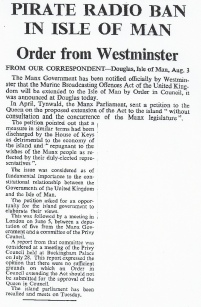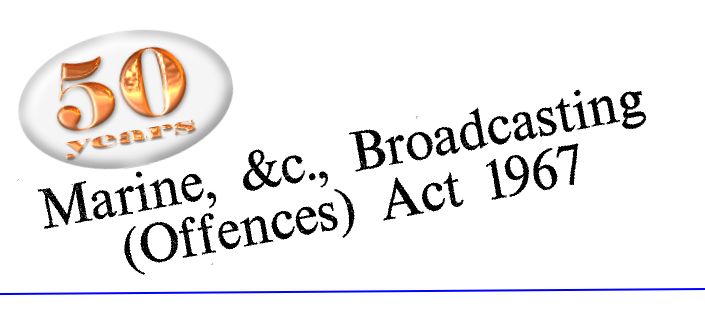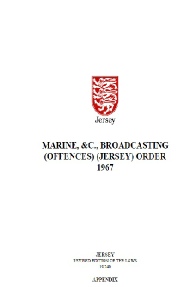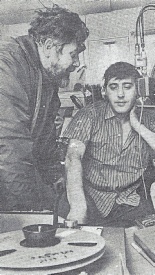© 2014-

ISLE OF MAN CONSTITUTIONAL CRISIS
One unexpected opposition to the Marine etc Broadcasting (Offences) Bill (and co-
Radio Caroline North's arrival off the Island in July 1964 had not been welcomed at first because it was seen as unfair competition for the recently launched (legal) local commercial radio station, Manx Radio.
However, Radio Caroline North did become very popular on the Island, not just because of the entertainment it provided, but because the station gave the Island's holiday resorts an immense amount of free publicity, greatly boosting the Manx tourist trade and general economy.
In April 1967, as the British House of Commons was approving the Marine etc. Broadcasting (Offences) Bill, the Isle of Man's House of Keys, voted to reject the same Bill being added to the Island's statute book.
In doing so the Island Government offered some hope for the future existence of Radio Caroline North and Ronan O'Rahilly even announced that he was negotiating with the Manx authorities to bring Radio Caroline ashore so that the station could operate from a base on the Island, although realistically this was unlikely to have been achieved at that time.
Throughout the summer of 1967, as the British Government proceeded with enacting its legislation, the Manx Government stood its rebellious ground. Undeterred, Westminster announced at the beginning of August 1967 that the Marine etc. Broadcasting (Offences) Act would be applied to the Island (and also the Channel Islands) by means of Orders in Council signed by the Queen -
The prospect of this unwanted piece of legislation being forced on the Island's statute book brought to the surface all the Manx nationalistic feelings and there was talk of the Island breaking its ties with Westminster and declaring complete independence.
An Independent Member of the House of Keys, Roy McDonald (who was also Chairman of the Manx Broadcasting Commission) proposed a resolution rejecting the imposition of legislation on the Island and demanded that the situation be considered by the United Nations Committee responsible for overseeing the interests of colonial peoples. Roy McDonald emphasised that he was not particularly supporting Radio Caroline, that just happened to have brought to light the real issue -
On 3rd August 1 967 it was announced that Tynwald's petition to the Privy Council Committee (which was responsible for extending the Marine etc. Broadcasting (Offences) Act to the Island) had been rejected and, as a consequence, the Queen would be asked to sign an Order in Council imposing the legislation on the Island. After this announcement there was speculation about the Island engaging in all sorts of rebellious activity -
967 it was announced that Tynwald's petition to the Privy Council Committee (which was responsible for extending the Marine etc. Broadcasting (Offences) Act to the Island) had been rejected and, as a consequence, the Queen would be asked to sign an Order in Council imposing the legislation on the Island. After this announcement there was speculation about the Island engaging in all sorts of rebellious activity -
Tynwald, the Manx Parliament, met on 8th August 1967 in a joint session of its two Houses -
When it came to the vote, the lower house, the House of Keys, supported Roy McDonald's amended resolution, but the upper house, the Legislative Council, voted unanimously against it. The House of Keys immediately adjourned to its own chamber and voted to continue with its previous decision to fight the imposition of unwanted mainland legislation.
Despite this show of defiance by the Manx Parliament the Marine etc Broadcasting (Offences) Act was imposed on the Island (and on the Channel Islands) by an Order in Council, signed by the Queen. This procedural delay meant that the Act did not come into force on the Island until midnight on 31st August 1967, so Radio Caroline North continued to be tendered from the Island until then.


The Isle of Ma n is a is a self-
n is a is a self-
The Island has its own Parliament (Tynwald) which is responsible for all domestic legislation (Foreign relations and defence are the responsibility of the British Government).
Tynwald is of Norse origin and over 1,000 years old, making it the oldest parliament in the world with an unbroken existence. It has two Chambers (known as Branches) -
When the two Chambers meet together once a month, they become Tynwald Court. The Chambers also sit jointly, on Tynwald Day (usually 5th July) at St John's for largely ceremonial purposes.

A copy of the Order in Council applying the MOA to the Channel Island of Jersey.A similar Order was applied to the Isle of Man.
Click to read the full document
LABOUR MP VISITS CAROLINE NORTH
During the two weeks ‘period of grace’ for Radio Caroline North a Labour MP, James Dunn visited the MV Caroline in Ramsey Bay and talked on air with DJ Don Allen on 24th August 1967.
Mr Dunn said his visit was to thank the station for supporting a charity of which he was a founder member (C.A.R.E.). During the interview he apologised for the Marine etc Broadcasting (Offences) Act saying, “I personally have my own views, but the Government has decided this and I must follow. I regret that it has happened”.
When asked later about the possible illegality of his visit to the offshore station Mr Dunn said, “ I understand the new Act does not apply to the Isle of Man until the order is made against it by the Manx Government – if that happens – next week. Anyway I do not agree with the Marine Offences Act in its present form.”

James Dunn MP talks on air with DJ Don Allen
The Times 4th August 1967
Click to enlarge



Ground
Back to








